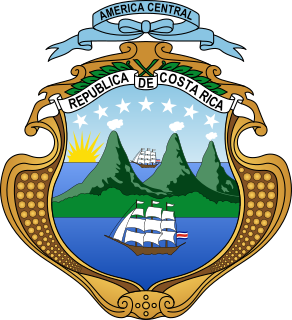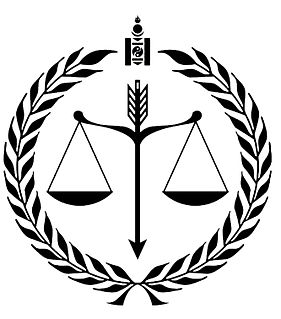
The Government of Italy is in the form of a democratic republic, and was established by a constitution in 1948. It consists of legislative, executive, and judicial subdivisions, as well as a Head of State, or President.

The Judicial Yuan is the judicial branch of the government of the Republic of China on Taiwan. It runs a Constitutional Court and oversees all systems of courts in Taiwan, including ordinary courts like the supreme court, high courts, district courts as well as special courts like administrative courts and disciplinary courts. By Taiwanese law, the Judicial Yuan holds the following powers:

The Constitution of the Italian Republic was enacted by the Constituent Assembly on 22 December 1947, with 453 votes in favour and 62 against. The text, which has since been amended sixteen times, was promulgated in an extraordinary edition of Gazzetta Ufficiale on 27 December 1947. The Constituent Assembly was elected by universal suffrage on 2 June 1946, on the same day as the referendum on the abolition of the monarchy was held. The election was held in all Italian provinces. The Constitution was drafted in 1946 and came into force on 1 January 1948, one century after the Constitution of the Kingdom of Italy, the Statuto Albertino, had been enacted.

The Oklahoma Court on the Judiciary is one of the two independent courts in the Oklahoma judiciary and has exclusive jurisdiction in adjudicating discipline and hearing cases involving the removal of a judge from office, excluding the Oklahoma Supreme Court, exercising judicial power under the Oklahoma Constitution.

The Supreme Court is the highest court in the Kingdom of Spain. Originally established pursuant to Title V of the Constitution of 1812 and currently regulated by Title VI of the Constitution of 1978, it has original jurisdiction over cases against high-ranking officials of the Kingdom and over cases regarding illegalization of political parties. It also has ultimate appellate jurisdiction over all cases. The Court has the power of judicial review, except for the judicial revision on constitutional matters, reserved to the Constitutional Court.

The Constitution of Kosovo, refers to the supreme law of the Republic of Kosovo. Article four of the constitution establishes the rules and separate powers of the three branches of the government. The unicameral Assembly of the Republic exercises the legislative power, the executive branch led by the President and the Prime Minister which are responsible for implementing laws and the judicial system headed by the Supreme Court.
The legal system of Azerbaijan is based on civil law. As the country was a republic of the Soviet Union until 1991, its legal history has also been influenced heavily by socialist law. However, after the collapse of the Soviet Union, Azerbaijan became independent by enactment of the constitutional act of national independence on October 18, 1991. Azerbaijan started reformation of the legal system by the establishing of democratic reforms. This was followed by the adoption of the first Constitution in 1995 which is the foundation of the legislative system of the modern country. The Constitution creates the system of presidential republic with a separation of powers among the Legislative, Executive and Judicial branches of the government in order to prevent abuse of power.
The law of the Republic of China as applied in Taiwan is based on civil law with its origins in the modern Japanese and German legal systems. The main body of laws are codified into the Six Codes:

The Supreme Court of Costa Rica is the court of greater hierarchy of Law and Justice in Costa Rica.

The Supreme Court of Mongolia is the highest court in the judicial system of Mongolia, and is generally the court of last resort for non-constitutional matters. It is established by Article 48(1) of the Constitution of Mongolia. The 1992 Constitution states in Article 50(1) that "the Supreme Court shall be the highest judicial organ".
Part Eight of the Constitution of Albania is the eighth of eighteen parts. Titled Constitutional Court, it consists of 11 articles. Together with Part Nine (The Courts), and Part Ten (The Office of the Prosecutor) underwent radical changes in 2016 during the so-called Justice Reform, which were the efforts of lawmakers to fight corruption, organized crime, nepotism in the justice system.
Part Nine of the Constitution of Albania is the ninth of eighteen parts. Titled The Courts, it consists of 22 articles including the Article 144 which was repealed in 2016. Together with Part Eight (Constitutional Court), and Part Ten (The Office of the Prosecutor) underwent radical changes in 2016 during the so-called Justice Reform, which were the efforts of lawmakers to fight corruption, organized crime, nepotism in the justice system.

Kosovo Judicial Council (KJC) is the oversight body that aims to ensure the independence and impartiality of the judicial system, and the administration of justice in Kosovo.
The Judiciary of Kosovo is the collection of the central Kosovo institutions that exercises judicial authority in Kosovo. According to the 2008 Constitution of Kosovo, the judicial system is composed of the Supreme Court and subordinate courts, a Constitutional Court, and an independent prosecutorial institution. The courts are administered by the Kosovo Judicial Council.

The judiciary is one of the three branches of state that make up the government of the Dominican Republic. Its function is to administer justice, for free, to decide on disputes between individuals or corporations, private or public, in every type of process, judgment and execution of judgment. They exercise for the courts and tribunals established by the Constitution and the law

The Supreme Court of the Dominican Republic is the highest court existing in the Republic and is, therefore, the head of the judiciary in the country.
The Judiciary of Azerbaijan exercises judicial power separately from the legislative power of parliament and executive power of the president.
Supreme Court of Azerbaijan is the highest court instance and final court of appeal of three-staged judicial system in Azerbaijan. Established in pursuant Article 131 of the Constitution of the Republic of Azerbaijan and Article 77 of the Law "on Courts and Judges". Supreme Court has competence to carry out justice on civil, criminal disputes and other cases related to the execution of general or specialized courts. Despite being established in Baku, its jurisdiction apply to entire territory of the Republic of Azerbaijan.

The Independent Qualification Commission (KPK) is a constitutional entity directly responsible for the assessment and re-evaluation of judges, prosecutors, inspectors, legal advisors and other members of Albania's justice system.
Part Ten of the Constitution of Albania is the tenth of eighteen parts. Titled The Office of the Prosecutor, it consists of 13 articles. Together with Part Eight (Constitutional Court), and Part Nine (The Courts) underwent radical changes in 2016 during the so-called Justice Reform, which were the efforts of lawmakers to fight corruption, organized crime, nepotism in the justice system.












